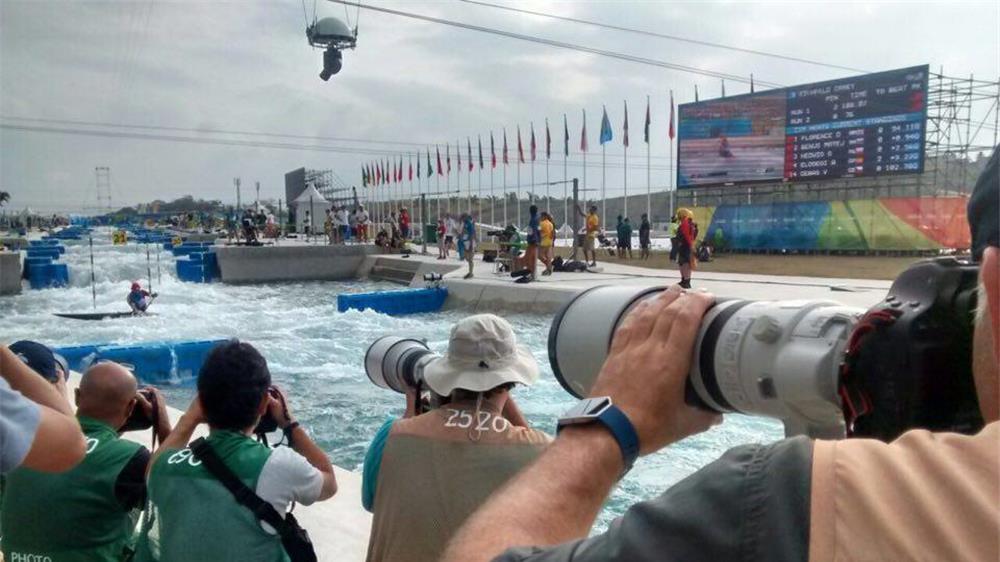انطلقت دورة الألعاب الأولومبية في الخامس من شهر أغسطس/آب الماضي في مدينة ريو دي جانيرو البرازيلية، وهي المرة الأولى التي تستقبل فيها القارة الأميركية الجنوبية هذه الدورة، والتي تعتبر بالإضافة لكأس العالم 2014 و"بان أميركان" 2007 من أضخم المناسبات الرياضية التي أقيمت على أراضي البرازيل وقد استقطبت أنظار العالم الذي تابعها عبر وسائل الإعلام لحظة بلحظة.
تنظيم عمل وسائل الإعلام
في هذا الأولمبياد وثّقت وسائل الإعلام العديد من المشاهد المهمَّة والمميزة والمثيرة للجدل على هامش الألعاب الرياضية، كمحاولات بعض المعترضين على إقامة هذا الأولمبياد والهجوم على الشعلة الأولمبية لإطفائها في أكثر من مدينة داخل البرازيل. إضافة لمشاهد أخرى، كصورة لاعبة كرة الشاطئ المصرية المحجّبة دعاء الغوباشي مع منافستها الألمانية كيرا ووكين هوست، أو عدم مصافحة لاعب الجودو المصري إسلام الشهابي لمنافسه "الإسرائيلي" أور ساسون، أو حتى التناقضات الطبقية الحادّة التي استطاعت كاميرات الصحافة العالمية توثيقها من خلال تصوير منطقة الأولمبياد التي تقع في منطقة يسكنها الأغنياء وقد تم فصلها عن مناطق الفقراء بجدار يمتد من المطار إلى المدينة الأولمبية. بالإضافة لأحداث العنف التي تعرّض لها بعض المشاركين من صحفيين ورياضيين وجمهور في مدينة تعتبر من بين أعنف عشر مدن على مستوى العالم.
لعب الإعلام أيضاً دوراً مهما، ليس فقط في نقل الحدث الرياضي المجرّد، بل وفي نقل التباينات والاختلافات الثقافية على أكثر من صعيد سواء من خلال تعريف العالم بالثقافة البرازيلية أو من خلال تعريف الشعب البرازيلي بالثقافات الأخرى عبر تقارير صحفية مترجمة من عدّة لغات كانت تُبث على كل وسائل الإعلام البرازيلية على مدار الساعة طوال فترة الأولمبياد.
ولتنظيم عمل الصحفيين، تم إنشاء "المركز الصحفي الرئيسي" في المدينة الأولمبية والذي بإمكانه التعامل مع حوالي 25,000 صحفي على مدار الساعة. وقد تواجد هذا العدد بالفعل لصحفيين جاؤوا من 105 دولة مختلفة لتغطية الأولمبياد. إضافة إلى 800 ألف شخص من داخل البرازيل وخارجها جاؤوا إلى ريو لمتابعة هذا الحدث.
ويضم هذا المركز لجنتين، واحدة دولية، والأخرى وطنية، و"لجنة خدمات البث الأولمبية (OBS) ". كانت مهمّة هذه اللجان تزويد الصحفيين بالمعلومات الكاملة عن طبيعة الرياضات ومواعيدها وأماكنها وتوفير خدمة الإنترنت والدروع الواقية، وهي تضم أعداداً هائلة من المتطوعين البرازيليين والأجانب تجاوزت أعدادهم الـ 50,000 متطوّع يمدّون يد العون للجميع وللصحفيين بشكل، كتقديم خدمات الترجمة على سبيل المثال، إذ أن بعض الصحفيين لا يتكلمون إلا لغاتهم المحلية، فيما يستطيع بعض المتطوعين للترجمة مرافقتهم بشكل دائم لتسهيل أعمالهم.
أما مهمة "لجنة خدمات البث الأولمبية (OBS) " بحسب المصورة الصحفية راكيل كونيا والتي تعمل ضمن الفريق الإداري لهذه اللجنة، فهي ترتيب أماكن المصورين الصحفيين والمصورين التلفزيونيين في الملاعب لضمان حرية الحركة لكل منهم، وبالتالي ضمان صورة أفضل، ولعدم تشويش أحدهم على الآخر، وهو ما تقرّره لجنة البث قبل شهر كامل من بدء الألعاب عبر إرسال وفد إلى المكان لإجراء دراسة شاملة، على أساسها يتم ترتيب كل شيء، إضافة لحقها في بيع حقوق البث.
هذا بالنسبة لتنظيم العمل في أثناء بدء دورة الألعاب الأولمبية. وكنتيجة لذلك، تعتبر كونيا أن المكان مناسب يسمح للمصور باقتناص اللحظة المناسبة، وهو ما ترجم فعلياً في العديد من الصور الاحترافية التي انتشرت سريعاً، والتي تعبّر عن تعدّد الثقافات، كصورة لاعبتي كرة الشاطئ، المصرية الغوباشي ومنافستها الألمانية هوست.

آلية اختيار فرق التغطية
أما كيف يتم اختيار المصورين الصحفيين والمراسلين البرازيليين وإرسالهم لتغطية الأولمبياد والآلية التي تعتمدها وسائل الإعلام البرازيلية في اختيار فرق التغطية والتنسيق فيما بينها، فيشرحها المصور الصحفي "أدريانو فيزوني" الذي يعمل مع صحيفة "فوليا دي ساوباولو" واسعة الإنتشار، وهو في الوقت ذاته أحد أعضاء مجموعة NOPP المكونة من نخبة المصورين البرازيليين وعددهم 11 ومنسّق واحد يشرف على عملها. لدى هذه المجموعة امتيازات حصرية تمكنهم من تغطية أهم المباريات، يقول فيزوني "لدى صحيفة فوليا دي ساوباولو مكتب في ريو دي جانيرو، لكنها ترسل فريقاً آخر من ساوباولو إلى ريو دي جانيرو، يتألّف من 30 صحفيا، يعملون بتوجيه اثنين من رؤساء التحرير المسؤولين عن كل شيء كالتقارير والمصورين والمراسلين، وهم يحدّدون لهؤلاء كل ما يتعلق بمسائل التغطية إلا أنهم وفي الوقت نفسه، يتلقون بعض التعليمات والمعلومات من هيئة تحرير الصحيفة في ساوباولو، وهو ما يحتاج لتنسيق عال جداً بين هيئتي التحرير في الولايتين.
هذا بالنسبة للتغطية، أما المشاكل التي تواجه الصحفيين البرازيليين والأجانب على حد سواء، فهي كثيرة جدّاً، لعل واحدة من أبرزها قضية الأمن الذاتي في مدينة كريو دي جانيرو، وهو ما أثارته أغلب وسائل الإعلام العالمية، إلا أن كثيرا من الصحفيين البرازيليين كأندريه ناديو، وهو صحفي مستقل، يعتبر أن "هنالك مبالغة بالرعب"، و يعطي مثالاً على ذلك "حادثة الحافلة التي كانت تقلّ الفريق الصحفي الصيني من المطار إلى المدينة الأولمبية، عندما تم رشقها بالحجارة، فقاموا -وبسبب لحظات الذعر التي عاشوها داخل الحافلة- بنشر الخبر على أنّه هجوم مسلّح!. وهذا واحد من الأخطاء التي لم تقع بها إلا الصحافة الدولية"، واستطرد "العنف نتاج ثقافة مختلفة في أميركا الجنوبية، والصحفيون الأجانب يأتون دون أدنى فكرة عن ذلك، وهو ما يسبّب العديد من المشاكل، حيث يذهب بعضهم للتصوير في أماكن غير آمنة، وهو ما يؤدّي للاعتداء عليهم وسرقة معدّاتهم".
وعن إيجابيات العمل في بطولة بهذه الضخامة، فهي بالنسبة لكونيا "اكتساب الخبرة من العمل مع صحفيين أجانب محترفين وذوي خبرات عالية، كالصحفيين الأوروبيين الذين غطّى بعضهم 9 بطولات أولمبية".
ازدحام وضياع وتعطيل
أمّا عن المصاعب والتحديات، فهي كثيرة، تبدأ بالازدحام الشديد الذي تسبب بتأخير الكثير من الصحفيين عن مواعيدهم، بل وضياعهم أحياناً بسبب المساحات الشاسعة بين ملعب وآخر، ولا تنتهي بعدم الشفافية والتستّر على المعلومات التي تخص تكاليف الدورة الأولمبية. فعلى الرغم من أن الدستور البرازيلي يضمن حرية الحصول على المعلومات، وهو ما دفع صحيفة "وول ستريت جورنال" الأميركية، والتي أعدّت تقريراً في غاية الأهمية عن أولمبياد ريو، أن ترفع دعوى أمام القضاء البرازيلي ضد بلدية ريو دي جانيرو، والتي اعتبرت أن بإمكانها الإفصاح عن المعلومات المتعلّقة بالمباريات فقط، لكن ليس عن تكاليف أي شيء آخر على الإطلاق. ولهذا تفسيره بحسب ناديو الذي يعتبر أن "حالة عدم الاستقرار التي تمر بها البلاد بعد إزاحة الرئيسة ديلما روسيف وسيطرة قوى اليمين على الحياة العامّة في البلاد، أفسح المجال لانتشار الفساد بشكل أكبر مما كان عليه في السابق".
على خلفية هذا الحدث الرياضي الضخم، انقسمت آراء الصحفيين البرازيليين إلى رأيين يعبران عن حدّة الانقسامات السياسية والأيديولوجية في البلاد. واحد يرى أن على الإعلام البرازيلي إظهار البلاد في أفضل مظهر من خلال الإضاءة على الإيجابيات، وتلافي السلبيات. فيما يعتبر القسم الآخر، أن الأولمبياد مناسبة مهمة على الإعلام البرازيلي والدولي أن يستغلّها ويكون أكثر وضوحاً، وأن يعمل على كشف الحقائق من خلال إظهار الفقر والظلم الذي يتعرّض له قسم كبير من السكان، والذي يساهم في رفع حدّة العنف.








































